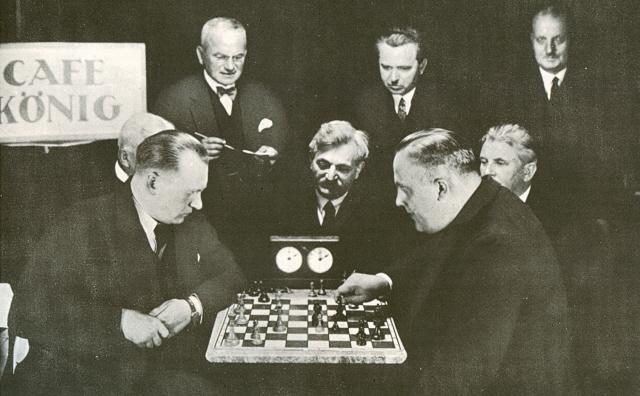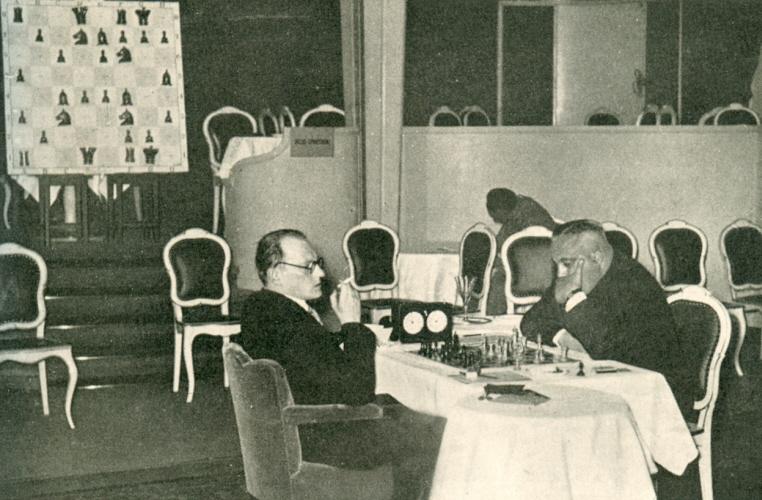Already in Buenos Aires, immediately after their World Championship match in 1927, Alekhine and Capablanca met to discuss the conditions regarding the potential Alekhine – Capablanca rematch. According to Kasparov (Garry Kasparov On My Great Predecessors, page 405), Capablanca suggested limiting the number of the games, but Alekhine was „fundamentally opposed to any change in the rules“ in regard to London agreement.
When everybody expected a formal challenge from Capablanca, he made a fatal blunder. In February 1928, he sent a letter to the FIDE President Reub (and a copy to Alekhine) in which he proposed that a limited number of games should be played in all future World Championship matches:
“In the light of the last experience at Buenos Aires I can only think of two modifications that should be made. These modifications are as follows:
A limit must be put to the number of games to be played in a match, and in my opinion the limit should be sixteen games.”
Although Capablanca was allegedly referring to future World Championship matches and not his rematch against Alekhine, Alekhine was offended by this letter. In an angry reply letter sent on 29 February 1928 he accused Capablanca of trying to change the match conditions he himself introduced back in 1922:
“After the match was over I made it clear to you that I was willing to play with you again only on strictly the same conditions as the first time. You told me that you quite agreed with this. Now you have evidently changed your mind, and are endeavoring to obtain on your own, modification of the rules of the Championship Matches.”
Thus, the relations between the two players were strained and the negotiations regarding the match were stalled.
At a time FIDE had zero influence whatsoever on the World Chess Championship. Most FIDE officials very much wanted to change that fact. In April and May, 1928, FIDE organized the match between Efim Bogoljubow and Max Euwe for the title of FIDE Champion. Reub said he “sympathises with the views expressed by Alekhine” and suggested that after Alekhine – Capablanca return match, FIDE should select four grandmasters and first of them should be considered as the World Championship Challenger.
For the moment, FIDE regarded Efim Bogoljubow as the official challenger. Bogoljubow, Russian master born in 1889, was a player of enterprising attacking style, the USSR champion in 1924 in 1925, Winner of Pistyan 1922 (ahead of Alekhine), Karlsbad 1923 (together with Alekhine) and a somewhat surprising winner of the Moscow 1925 International tournament (ahead of Lasker and Capablanca). At the FIDE Congress in August, 1928, he was confirmed as the official challenger and after he won the strong Bad Kissingen tournament in the same year, he sent an official challenge to Alekhine.
Alekhine accepted the challenge and states that “it goes without saying that the match can proceed only under the conditions of the London agreement (1922), which, incidentally, was signed by us both. “ (Garry Kasparov On My Great Predecessors, page 406)
In October 1928, Capablanca also sent his challenge, but Alekhine, having accepted Bogoljubow’s challenge first, merely stated he will “take Capa’s challenge into account.” He proceeded to give Bogoljubow a three-month deadline to provide a 500$ deposit, or “I will consider myself obliged to accept the challenge of Capablanca.”
Bogoljubow had difficulties raising not only the 10000$ “Golden Wall” sum but also the 500$ deposit. However, Alekhine, in an enviable display of hypocrisy, signed a match agreement differing from the London rules. First of all, the number of the games was limited to 30 and the winner would become the first player to win six games.

More importantly, Bogoljubow didn’t manage to raise 10000 $ sum. The agreement stated Alekhine would receive a 6000$ appearance fee, and Bogoljubow all the extra money. However, later it transpired Bogoljubow hadn’t earned a single penny; he played only for the title of the champion.
In any case, the Alekhine – Bogoljubow World Championship match began on September 6, 1929. The match was played in Germany and Netherlands. Before the match, Alekhine tried to justify the choice of the challenger with the claims such as:
“Bogoljubow plays completely differently to Capablanca, and he is a more dangerous opponent. He is an outstanding master of the opening; his play is notable for its exceptional boldness.”
The course of the match showed such claims were completely unfounded. The match was pretty much a one-way street, after the initial exchange of fire and the 2-2 score, Alekhine won four games in the span between 7th and 12th game. Almost everyone agreed that overall quality of play was much lower than in the Alekhine – Capablanca match. 13th and 14th game provided Bogoljubow with some hope, but after 25 games Alekhine won the match with the overwhelming +11-5=9 score and retained his title.
It was clear Alekhine wasn’t eager to face Capablanca in yet another match and that Bogoljubow was much comfortable opponent for him. The further course of events would merely prove this speculation. During his tenure as a World Champion, Alekhine demanded additional appearance fee to play in tournaments where Capa was also invited. Also, Alekhine – Capablanca rematch never actually happened; Alekhine played yet another match against Bogoljubow in 1934 instead.
Sources
Chesspedia: Alekhine – Bogoljubow, 1929
Chessgames: Alekhine – Bogoljubow, 1929
Garry Kasparov: On My Great Predecessors, Part One
All photos were taken from www.chesshistory.com

